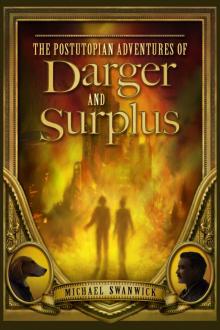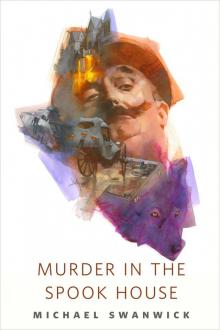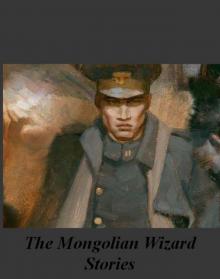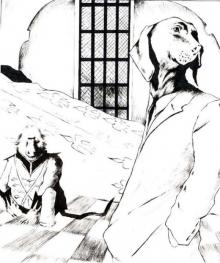- Home
- Michael Swanwick
The Postutopian Adventures of Darger and Surplus Page 2
The Postutopian Adventures of Darger and Surplus Read online
Page 2
Surplus smiled down again at the necklace, draped about her lovely throat and above her perfect breasts. “I assure you, madame, it was not your necklace that held me so enthralled.”
She colored delicately, pleased. Lightly, she said, “And that box your man carries with him wherever you go? What is in it?”
“That? A trifle. A gift for the Duke of Muscovy, who is the ultimate object of my journey,” Surplus said. “I assure you, it is of no interest whatsoever.”
“You were talking to someone last night,” Lady Pamela said. “In your room.”
“You were listening at my door? I am astonished and flattered.”
She blushed. “No, no, my brother…it is his job, you see, surveillance.”
“Possibly I was talking in my sleep. I have been told I do that occasionally.”
“In accents? My brother said he heard two voices.”
Surplus looked away. “In that, he was mistaken.”
England’s queen was a sight to rival any in that ancient land. She was as large as the lorry of ancient legend, and surrounded by attendants who hurried back and forth, fetching food and advice and carrying away dirty plates and signed legislation. From the gallery, she reminded Darger of a queen bee, but unlike the bee, this queen did not copulate, but remained proudly virgin.
Her name was Gloriana the First, and she was a hundred years old and still growing.
Lord Campbell-Supercollider, a friend of Lady Pamela’s met by chance, who had insisted on accompanying them to the gallery, leaned close to Surplus and murmured, “You are impressed, of course, by our queen’s magnificence.” The warning in his voice was impossible to miss. “Foreigners invariably are.”
“I am dazzled,” Surplus said.
“Well might you be. For scattered through her majesty’s great body are thirty-six brains, connected with thick ropes of ganglia in a hypercube configuration. Her processing capacity is the equal of many of the great computers from Utopian times.”
Lady Pamela stifled a yawn. “Darling Rory,” she said, touching the Lord Campbell-Supercollider’s sleeve. “Duty calls me. Would you be so kind as to show my American friend the way back to the outer circle?”
“Or course, my dear.” He and Surplus stood (Darger was, of course, already standing) and paid their compliments. Then, when Lady Pamela was gone and Surplus started to turn toward the exit, “Not that way. Those stairs are for commoners. You and I may leave by the gentlemen’s staircase.”
The narrow stairs twisted downward beneath clouds of gilt cherubs-and-airships, and debouched into a marble-floored hallway. Surplus and Darger stepped out of the stairway and found their arms abruptly seized by baboons.
There were five baboons all told, with red uniforms and matching choke collars with leashes that gathered in the hand of an ornately mustached officer whose gold piping identified him as a master of apes. The fifth baboon bared his teeth and hissed savagely.
Instantly, the master of apes yanked back on his leash and said, “There, Hercules! There, sirrah! What do you do? What do you say?”
The baboon drew himself up and bowed curtly. “Please come with us,” he said with difficulty. The master of apes cleared his throat. Sullenly, the baboon added, “Sir.”
“This is outrageous!” Surplus cried. “I am a diplomat, and under international law immune to arrest.”
“Ordinarily, sir, this is true,” said the master of apes courteously. “However, you have entered the inner circle without her majesty’s invitation and are thus subject to stricter standards of security.”
“I had no idea these stairs went inward. I was led here by—” Surplus looked about helplessly. Lord Campbell-Supercollider was nowhere to be seen.
So, once again, Surplus and Darger found themselves escorted to the Office of Protocol.
“The wood is teak. Its binomial is Tectona grandis. Teak is native to Burma, Hind, and Siam. The box is carved elaborately but without refinement.” The dwarf savant opened it. “Within the casing is an archaic device for electronic intercommunication. The instrument chip is a gallium-arsenide ceramic. The chip weighs six ounces. The device is a product of the Utopian end-times.”
“A modem!” The protocol officer’s eyes bugged out. “You dared bring a modem into the inner circle and almost into the presence of the queen?” His chair stood and walked around the table. Its six insectile legs looked too slender to carry his great, legless mass. Yet it moved nimbly and well.
“It is harmless, sir. Merely something our technarchaeologists unearthed and thought would amuse the Duke of Muscovy, who is well known for his love of all things antiquarian. It is, apparently, of some cultural or historical significance, though without rereading my instructions, I would be hard pressed to tell you what.”
Lord Coherence-Hamilton raised his chair so that he loomed over Surplus, looking dangerous and domineering. “Here is the historic significance of your modem: The Utopians filled the world with their computer webs and nets, burying cables and nodes so deeply and plentifully that they shall never be entirely rooted out. They then released into that virtual universe demons and mad gods. These intelligences destroyed Utopia and almost destroyed humanity as well. Only the valiant worldwide destruction of all modes of interface saved us from annihilation.
“Oh, you lackwit! Have you no history? These creatures hate us because our ancestors created them. They are still alive, though confined to their electronic netherworld, and want only a modem to extend themselves into the physical realm. Can you wonder, then, that the penalty for possessing such a device is—” he smiled menacingly—“death?”
“No, sir, it is not. Possession of a working modem is a mortal crime. This device is harmless. Ask your savant.”
“Well?” the big man growled at his dwarf. “Is it functional?”
“No. It—”
“Silence.” Lord Coherence-Hamilton turned back to Surplus. “You are a fortunate cur. You will not be charged with any crimes. However, while you are here, I will keep this filthy device locked away and under my control. Is that understood, Sir Bow-Wow?”
Surplus sighed. “Very well,” he said. “It is only for a week, after all.”
That night, the Lady Pamela Coherence-Hamilton came by Surplus’s room to apologize for the indignity of his arrest, of which, she assured him, she had just now learned. He invited her in. In short order they somehow found themselves kneeling face-to-face on the bed, unbuttoning each other’s clothing.
Lady Pamela’s breasts had just spilled delightfully from her dress when she drew back, clutching the bodice closed again, and said, “Your man is watching us.”
“And what concern is that to us?” Surplus said jovially. “The poor fellow’s an autistic. Nothing he sees or hears matters to him. You might as well be embarrassed by the presence of a chair.”
“Even were he a wooden carving, I would his eyes were not on me.”
“As you wish.” Surplus clapped his paws. “Sirrah! Turn around.”
Obediently, Darger turned his back. This was his first experience with his friend’s astonishing success with women. How many sexual adventuresses, he wondered, might one tumble, if one’s form were unique? On reflection, the question answered itself.
Behind him, he heard the Lady Pamela giggle. Then, in a voice low with passion, Surplus said, “No, leave the diamonds on.”
With a silent sigh, Darger resigned himself to a long night. Since he was bored and yet could not turn to watch the pair cavorting on the bed without giving himself away, he was perforce required to settle for watching them in the mirror.
They began, of course, by doing it doggy-style.
The next day, Surplus fell sick. Hearing of his indisposition, Lady Pamela sent one of her autistics with a bowl of broth and then followed, herself, in a surgical mask.
Surplus smiled weakly to see her. “You have no need of that mask,” he said. “By my life, I swear that what ails me is not communicable. As you doubtless know, we who have
been remade are prone to endocrinological imbalance.”
“Is that all?” Lady Pamela spooned some broth into his mouth, then dabbed at a speck of it with a napkin. “Then fix it. You have been very wicked to frighten me over such a trifle.”
“Alas,” Surplus said sadly, “I am a unique creation, and my table of endocrine balances was lost in an accident at sea. There are copies in Vermont, of course. But by the time even the swiftest schooner can cross the Atlantic twice, I fear me I shall be gone.”
“Oh, dearest Surplus!” The Lady caught up his paws in her hands. “Surely there is some measure, however desperate, to be taken?”
“Well…” Surplus turned to the wall in thought. After a very long time, he turned back and said, “I have a confession to make. The modem your brother holds for me? It is functional.”
“Sir!” Lady Pamela stood, gathering her skirts, and stepped away from the bed in horror. “Surely not!”
“My darling and delight, you must listen to me.” Surplus glanced weakly toward the door, then lowered his voice. “Come close and I shall whisper.”
She obeyed.
“In the waning days of Utopia, during the war between men and their electronic creations, scientists and engineers bent their efforts toward the creation of a modem that could be safely employed by humans. One immune from the attack of demons. One that could, indeed, compel their obedience. Perhaps you have heard of this project.”
“There are rumors, but…no such device was ever built.”
“Say rather that no such device was built in time. It had just barely been perfected when the mobs came rampaging through the laboratories, and the Age of the Machine was over. Some few, however, were hidden away before the last technicians were killed. Centuries later, brave researchers at the Technarchaeological Institute of Shelburne recovered six such devices and mastered the art of their use. One device was destroyed in the process. Two are kept in Burlington. The others were given to trusted couriers and sent to the three most powerful allies of the Demesne—one of which is, of course, Russia.”
“This is hard to believe,” Lady Pamela said wonderingly. “Can such marvels be?”
“Madame, I employed it two nights ago in this very room! Those voices your brother heard? I was speaking with my principals in Vermont. They gave me permission to extend my stay here to a fortnight.”
He gazed imploringly at her. “If you were to bring me the device, I could then employ it to save my life.”
Lady Coherence-Hamilton resolutely stood. “Fear nothing, then. I swear by my soul, the modem shall be yours tonight.”
The room was lit by a single lamp which cast wild shadows whenever anyone moved, as if of illicit spirits at a witch’s Sabbath.
It was an eerie sight. Darger, motionless, held the modem in his hands. Lady Pamela, who had a sense of occasion, had changed to a low-cut gown of clinging silks, dark-red as human blood. It swirled about her as she hunted through the wainscoting for a jack left unused for centuries. Surplus sat up weakly in bed, eyes half-closed, directing her. It might have been, Darger thought, an allegorical tableau of the human body being directed by its sick animal passions, while the intellect stood by, paralyzed by lack of will.
“There!” Lady Pamela triumphantly straightened, her necklace scattering tiny rainbows in the dim light.
Darger stiffened. He stood perfectly still for the length of three long breaths, then shook and shivered like one undergoing seizure. His eyes rolled back in his head.
In hollow, unworldly tones, he said, “What man calls me up from the vasty deep?” It was a voice totally unlike his own, one harsh and savage and eager for unholy sport. “Who dares risk my wrath?”
“You must convey my words to the autistic’s ears,” Surplus murmured. “For he is become an integral part of the modem—not merely its operator, but its voice.”
“I stand ready,” Lady Pamela replied.
“Good girl. Tell it who I am.”
“It is Sir Blackthorpe Ravenscairn de Plus Precieux who speaks, and who wishes to talk to…” She paused.
“To his most august and socialist honor, the mayor of Burlington.”
“His most august and socialist honor,” Lady Pamela began. She turned toward the bed and said quizzically, “The mayor of Burlington?”
“’Tis but an official title, much like your brother’s, for he who is in fact the spy-master for the Demesne of Western Vermont,” Surplus said weakly. “Now repeat to it: I compel thee on threat of dissolution to carry my message. Use those exact words.”
Lady Pamela repeated the words into Darger’s ear.
He screamed. It was a wild and unholy sound that sent the Lady skittering away from him in a momentary panic. Then, in mid-cry, he ceased.
“Who is this?” Darger said in an entirely new voice, this one human. “You have the voice of a woman. Is one of my agents in trouble?”
“Speak to him now, as you would to any man: forthrightly, directly, and without evasion.” Surplus sank his head back on his pillow and closed his eyes.
So (as it seemed to her) the Lady Coherence-Hamilton explained Surplus’s plight to his distant master, and from him received both condolences and the needed information to return Surplus’s endocrine levels to a functioning harmony. After proper courtesies, then, she thanked the American spy-master and unjacked the modem. Darger returned to passivity.
The leather-cased endocrine kit lay open on a small table by the bed. At Lady Pamela’s direction, Darger began applying the proper patches to various places on Surplus’s body. It was not long before Surplus opened his eyes.
“Am I to be well?” he asked and, when the Lady nodded, “Then I fear I must be gone in the morning. Your brother has spies everywhere. If he gets the least whiff of what this device can do, he’ll want it for himself.”
Smiling, Lady Pamela hoisted the box in her hand. “Indeed, who can blame him? With such a toy, great things could be accomplished.”
“So he will assuredly think. I pray you, return it to me.”
She did not. “This is more than just a communication device, sir,” she said. “Though in that mode it is of incalculable value. You have shown that it can enforce obedience on the creatures that dwell in the forgotten nerves of the ancient world. Ergo, they can be compelled to do our calculations for us.”
“Indeed, so our technarchaeologists tell us. You must—”
“We have created monstrosities to perform the duties that were once done by machines. But with this, there would be no necessity to do so. We have allowed ourselves to be ruled by an icosahexadexal-brained freak. Now we have no need for Gloriana the Gross, Gloriana the Fat and Grotesque, Gloriana the Maggot Queen.”
“Madame!”
“It is time, I believe, that England had a new queen. A human queen.”
“Think of my honor!”
Lady Pamela paused in the doorway. “You are a very pretty fellow indeed. But with this, I can have the monarchy and keep such a harem as will reduce your memory to that of a passing and trivial fancy.”
With a rustle of skirts, she spun away.
“Then I am undone!” Surplus cried, and fainted onto the bed.
Quietly, Darger closed the door. Surplus raised himself from the pillows, began removing the patches from his body, and said, “Now what?”
“Now we get some sleep,” Darger said. “Tomorrow will be a busy day.”
The master of apes came for them after breakfast, and marched them to their usual destination. By now Darger was beginning to lose track of exactly how many times he had been in the Office of Protocol. They entered to find Lord Coherence-Hamilton in a towering rage, and his sister, calm and knowing, standing in a corner with her arms crossed, watching. Looking at them both now, Darger wondered how he could ever have imagined that the brother outranked his sister.
The modem lay opened on the dwarf-savant’s desk. The little fellow leaned over the device, studying it minutely.
Nobody said anyth
ing until the master of apes and his baboons had left. Then Lord Coherence-Hamilton roared, “Your modem refuses to work for us!”
“As I told you, sir,” Surplus said coolly, “it is inoperative.”
“That’s a bold-arsed fraud and a goat-buggering lie!” In his wrath, the Lord’s chair rose up on its spindly legs so high that his head almost bumped against the ceiling. “I know of your activities—” he nodded toward his sister—“and demand that you show us how this whoreson device works!”
“Never!” Surplus cried stoutly. “I have my honor, sir.”
“Your honor, too scrupulously insisted upon, may well lead to your death, sir.”
Surplus threw back his head. “Then I die for Vermont!”
At this moment of impasse, Lady Hamilton stepped forward between the two antagonists to restore peace. “I know what might change your mind.” With a knowing smile, she raised a hand to her throat and denuded herself of her diamonds. “I saw how you rubbed them against your face the other night. How you licked and fondled them. How ecstatically you took them into your mouth.”
She closed his paws about them. “They are yours, sweet ’Sieur, Precieux, for a word.”
“You would give them up?” Surplus said, as if amazed at the very idea. In fact, the necklace had been his and Darger’s target from the moment they’d seen it. The only barrier that now stood between them and the merchants of Amsterdam was the problem of freeing themselves from the Labyrinth before their marks finally realized that the modem was indeed a cheat. And to this end they had the invaluable tool of a thinking man whom all believed to be an autistic, and a plan that would give them almost twenty hours in which to escape.
“Only think, dear Surplus.” Lady Pamela stroked his head and then scratched him behind one ear, while he stared down at the precious stones. “Imagine the life of wealth and ease you could lead, the women, the power. It all lies in your hands. All you need do is close them.”

 The New Prometheus
The New Prometheus The Iron Dragon’s Mother
The Iron Dragon’s Mother The Mongolian Wizard Stories
The Mongolian Wizard Stories The Postutopian Adventures of Darger and Surplus
The Postutopian Adventures of Darger and Surplus Day of the Kraken
Day of the Kraken Cold Iron
Cold Iron Murder in the Spook House: A Tor.com Original
Murder in the Spook House: A Tor.com Original Radio Waves
Radio Waves The New Prometheus: A Tor.com Original
The New Prometheus: A Tor.com Original Stations of the Tide
Stations of the Tide Vacuum Flowers
Vacuum Flowers The Mongolian Wizard Stories (online stories 1-7)
The Mongolian Wizard Stories (online stories 1-7) The Dragons of Babel
The Dragons of Babel The Dog Said Bow-Wow
The Dog Said Bow-Wow Griffin's Egg
Griffin's Egg The Best of Michael Swanwick
The Best of Michael Swanwick Not So Much, Said the Cat
Not So Much, Said the Cat In the Drift
In the Drift Vacumn Flowers
Vacumn Flowers Slow Life
Slow Life The Wisdom Of Old Earth
The Wisdom Of Old Earth Legions In Time
Legions In Time Scherzo with Tyrannosaur
Scherzo with Tyrannosaur The Year's Best Science Fiction (2008 Edition)
The Year's Best Science Fiction (2008 Edition) The Iron Dragon's Daughter
The Iron Dragon's Daughter The Very Pulse of the Machine
The Very Pulse of the Machine Zeppelin City
Zeppelin City Dancing with Bears
Dancing with Bears Bones of the Earth
Bones of the Earth Tales of Old Earth
Tales of Old Earth Trojan Horse
Trojan Horse Radiant Doors
Radiant Doors